Sep 9, 2024 – Oceania Dharma Q&A Tour (5) in Perth
Hello. Today is the fifth day of the Oceania lecture tour, with an English-interpreted lecture for locals and a Dharma Q&A session for Korean expatriates in Perth.
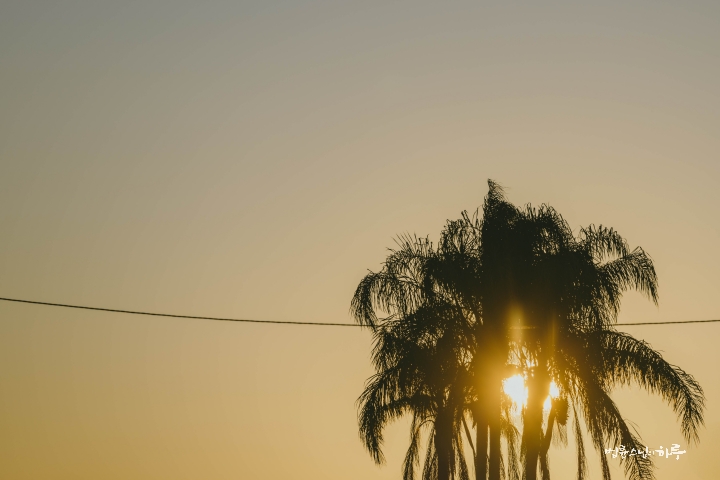
After completing his morning practice and meditation, Sunim had breakfast at 6 AM in his accommodation. After finishing the meal and before departing, he presented his book on the Heart Sutra to Mr. Kim Seung-ju and Mrs. Choi Young-hee, the couple who provided lodging and meals for the night, as a token of gratitude.
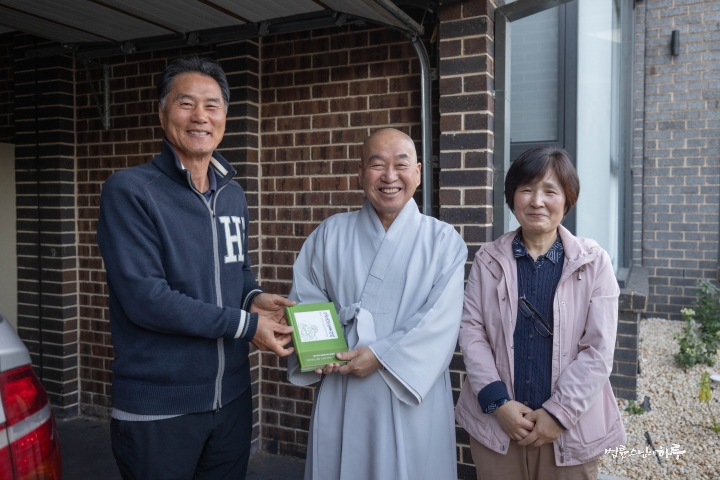
“Thank you. I had a pleasant stay.”
After expressing his gratitude, Sunim headed to Melbourne Airport.
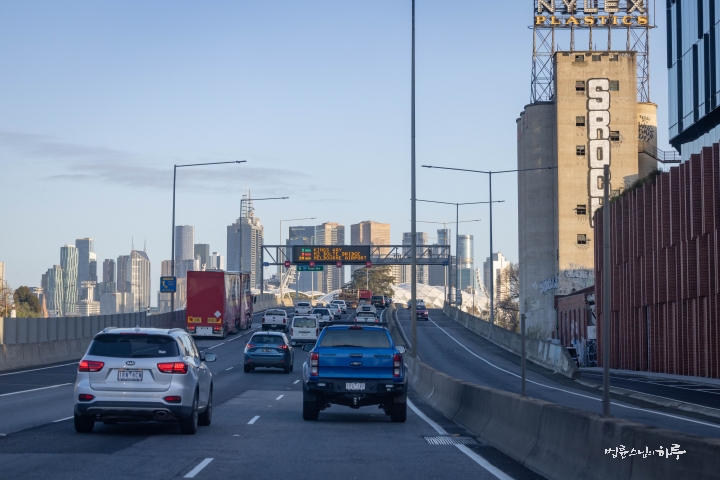
Arriving at Melbourne Airport at 8 AM, he checked in his luggage and proceeded to the boarding gate. While waiting at the gate, he attended to some work before departing from Melbourne Airport at 9:20 AM. After a 4-hour and 10-minute flight, he arrived at Perth Airport in Australia at 11:30 AM local time.
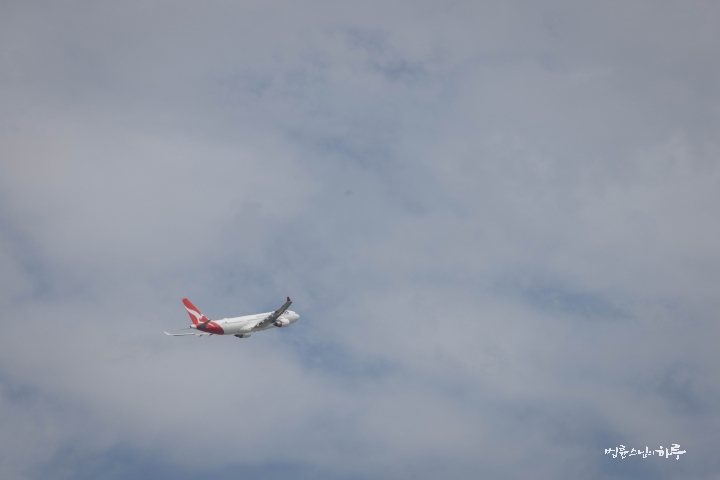
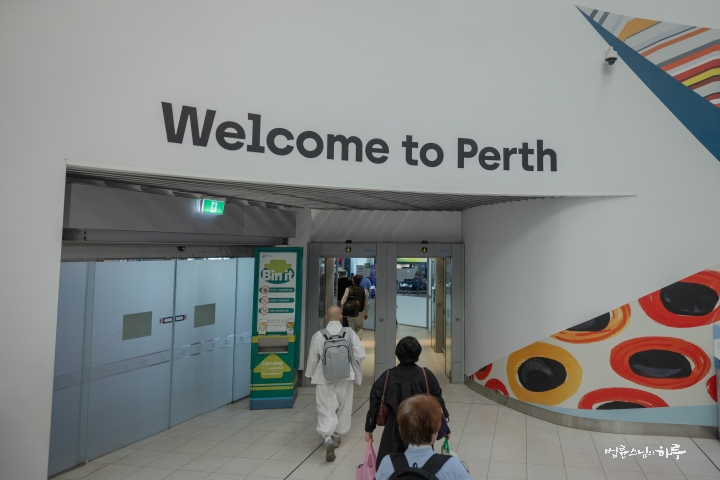
After retrieving his luggage and completing immigration procedures, Sunim was greeted outside the airport by Heo Cheong and members of the Perth Jungto Society who had prepared for the lecture.
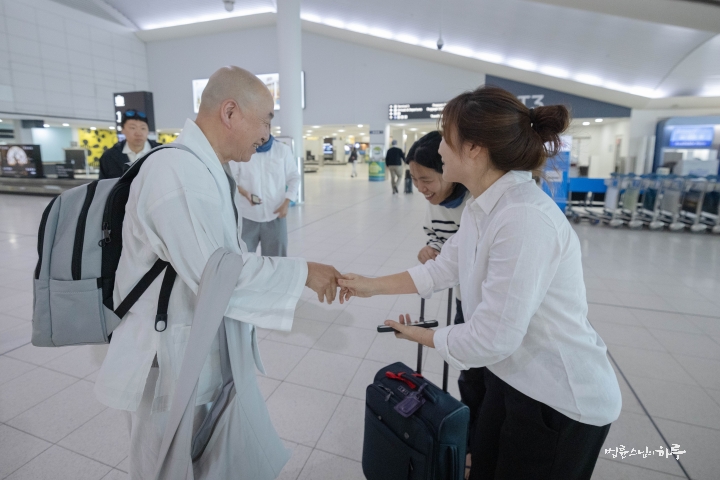
“Welcome to Perth.”
After exchanging warm greetings and taking commemorative photos, they immediately headed to the accommodation.
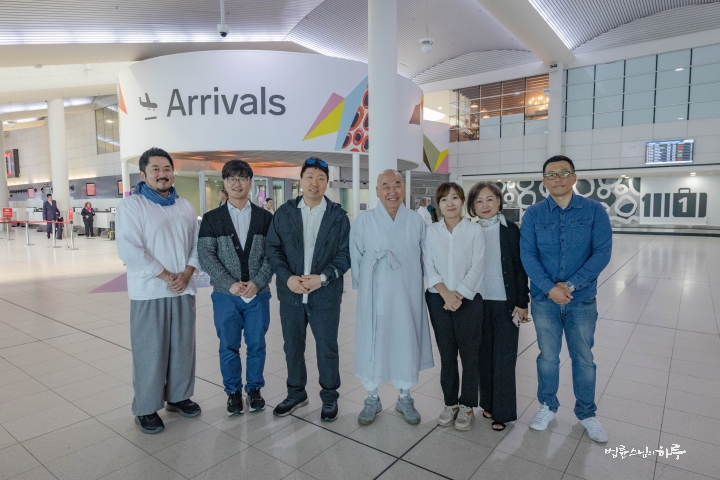
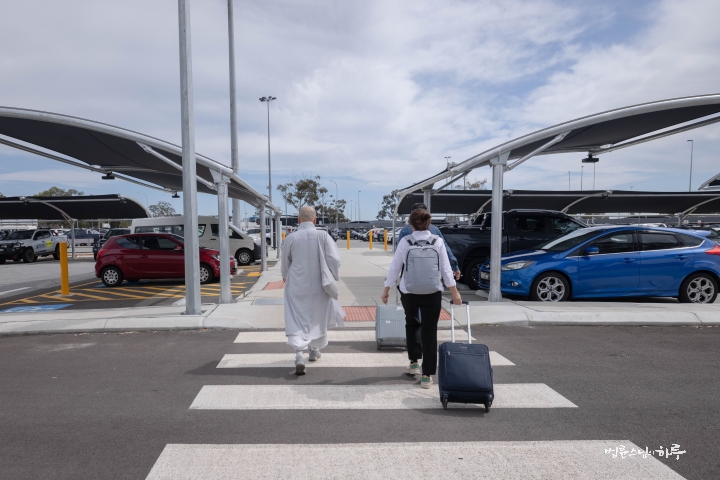
Considering Sunim’s tight schedule, the lecture preparation team had arranged accommodation near the lecture venue. After a 20-minute drive from the airport, they arrived at the accommodation at 12:40 PM. After lunch, Sunim handled some work-related matters, communicating with Korea.
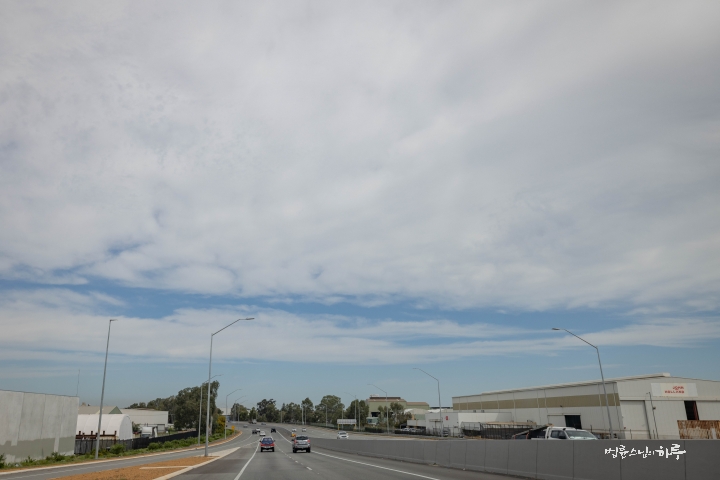
Spring has arrived in Australia. Being in the Southern Hemisphere, the seasons are opposite to those in Korea.
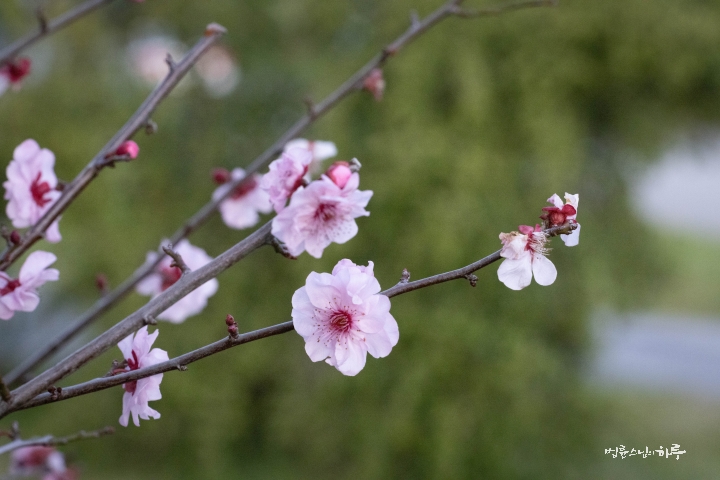
After about an hour of work, Sunim headed to the lecture venue for the English-interpreted lecture for locals. This lecture was hastily arranged upon hearing that there were many Bhutanese people in Perth, Australia.
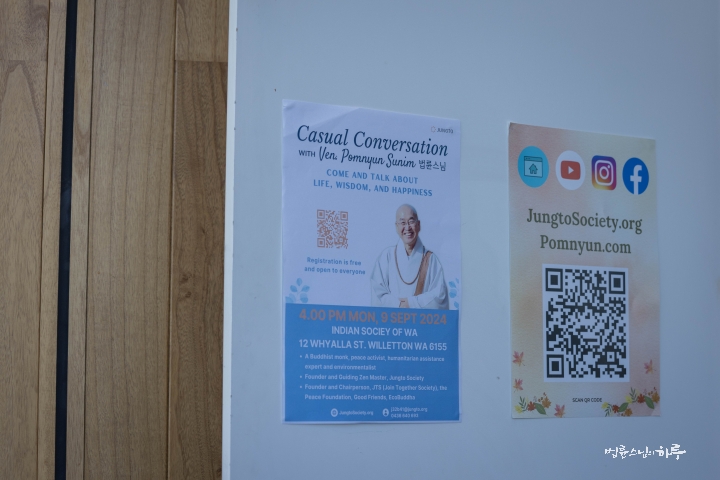
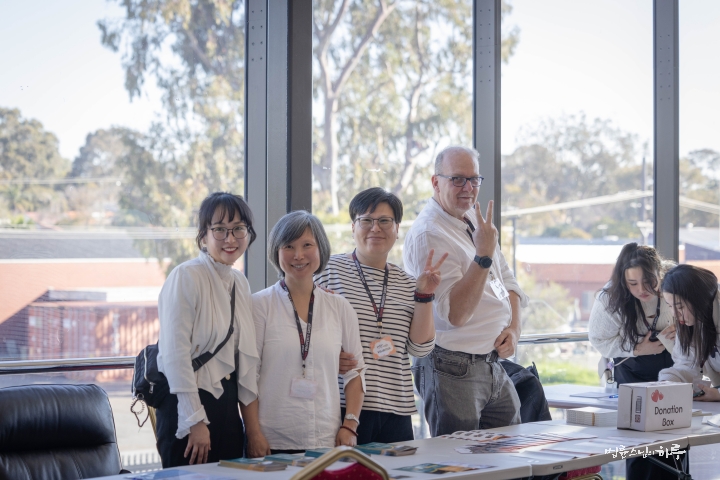
Today’s lecture is being held at the Indian Community Center (Indian Society of WA) located in Willetton. The building is operated by the Indian Society of Western Australia (ISWA) and was lent for Sunim’s lecture today.
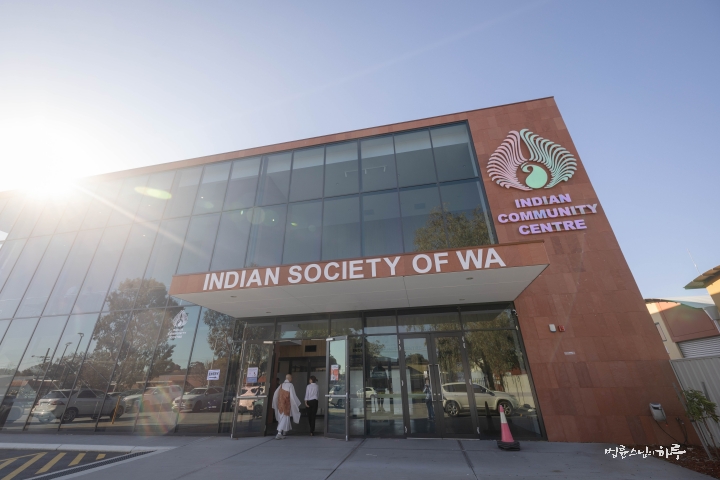
The lecture began at 4 PM sharp, after watching a video showing Sunim’s visits to Bhutan over the past year to create a new model for sustainable development.
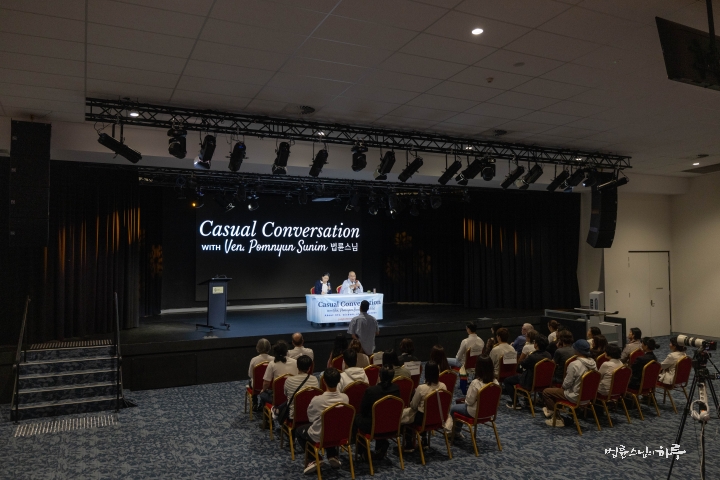
Despite the hasty preparation, about 20 people heard about the lecture and attended. However, unfortunately, there were no Bhutanese people among the attendees. Sunim began the conversation with a smile.
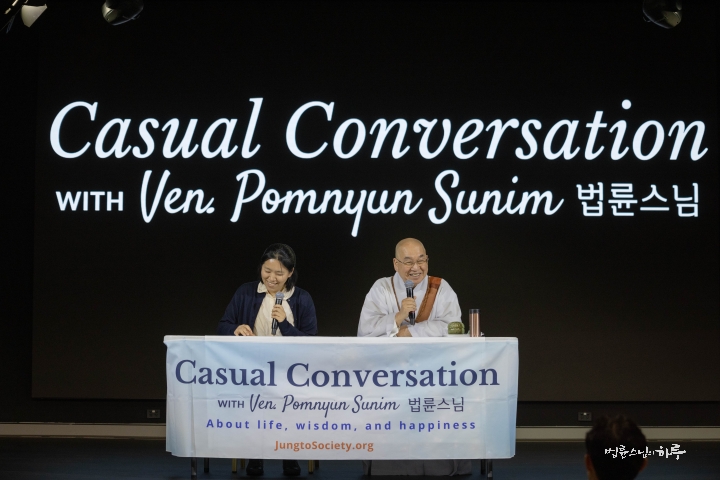
“I’ve been involved in various sustainable development activities in Bhutan, and I heard that many Bhutanese people live in Perth. So, I decided to schedule a lecture for the Bhutanese community in Perth. However, due to the rushed scheduling, we couldn’t promote it well to the Bhutanese people, so it seems they couldn’t make it. It’s unfortunate, but we’ll have to settle for a general discussion about our lives instead.” (laughs)“
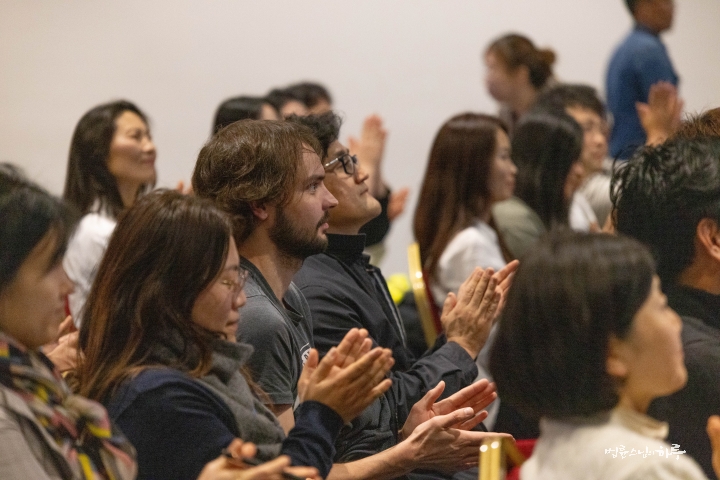
Then, anyone could raise their hand and ask Sunim a question. Over the course of an hour and a half, five people engaged in dialogue with Sunim.
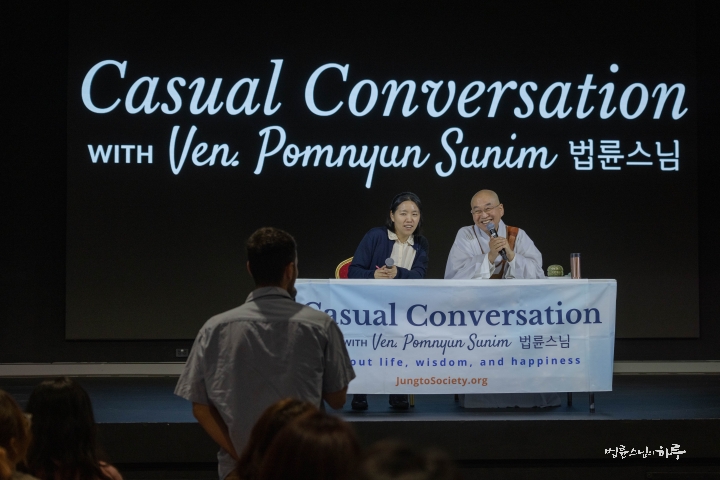
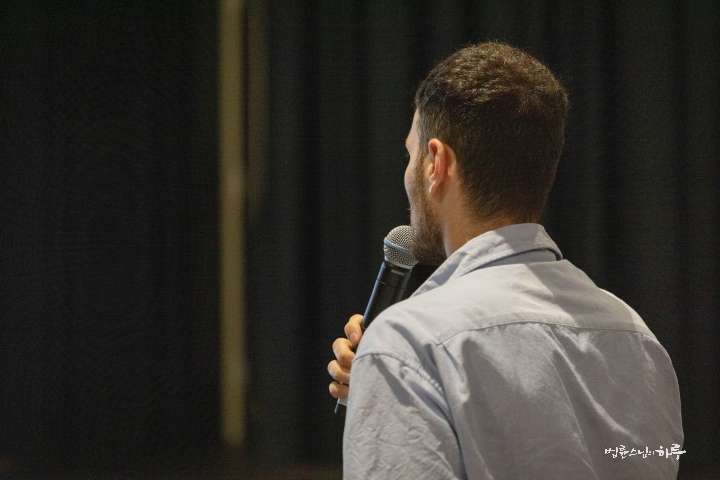
As a son, what can I do to help my family overcome their anger and regret? Is trying to help an inappropriate action?
How can we free ourselves from worries about the future?
Does wisdom bring happiness? Why do past mistakes always bring regret?
I’m transitioning from teenager to adult. Is it right to spend time on career and success, or is it better to make memories with friends? Which is more important?
I need to make a decision, but I can’t because I have to consider my relationship with the other person. What should I do in this situation?
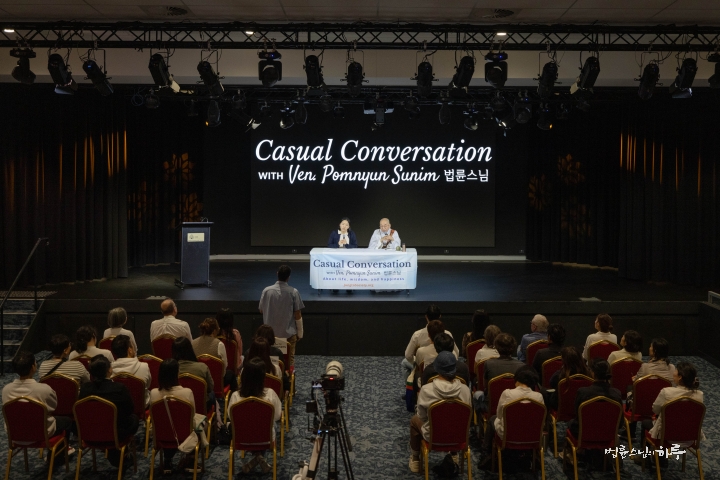
After finishing the conversation, Sunim briefly spoke about the original topic he intended to discuss with the Bhutanese people: “Climate Crisis and Sustainable Development.”
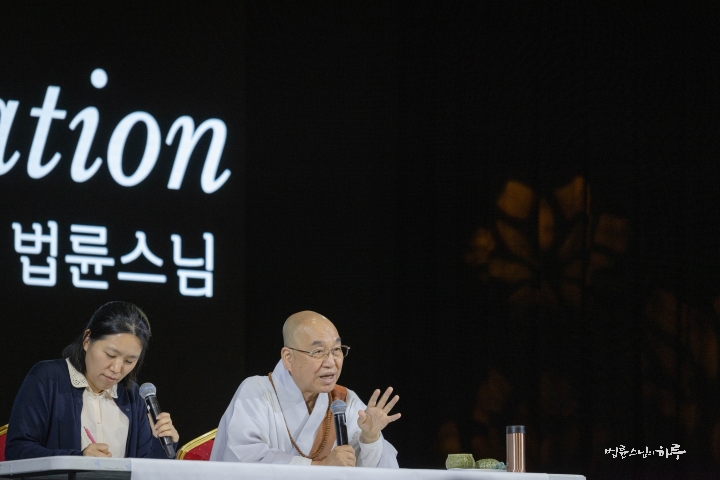
“Bhutan has a small population, but these days many people are leaving the country to earn money abroad. As a result, there are hardly any young people left in Bhutan. So today, I arranged this gathering to have a conversation with the young people of Bhutan on the topic of ‘How can we truly live well?’
I understand that in today’s era, where material production index is used as a standard for living well, it’s natural to want to live in more developed countries. However, in this age of climate crisis, we need to reduce our consumption to overcome this crisis. We need to create a model in advance that can suggest ‘there is this way of life’ when, in 50 to 100 years, environmental pollution becomes so severe that it’s impossible to continue living in the current way. That’s why I’m currently working on a sustainable village development movement with residents in the Zhemgang region, which is the least developed area in Bhutan. I would like to ask all of you to strengthen your efforts to reduce consumption to overcome the climate crisis.”
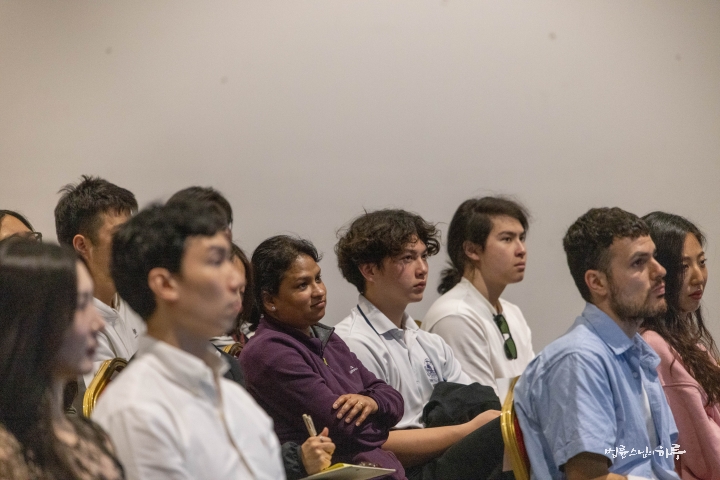
In the Era of Climate Crisis, Excessive Consumption by the Wealthy Is a Serious Crime
“There’s no need to feel inferior because you’re poor. Among wealthy people, some consume as much as 100 or 1,000 people combined. In this era of climate crisis, such behavior is a serious crime. Yet, we envy them. As long as we envy this, it will be difficult to overcome the climate crisis. The less you consume, the more you can slow down the climate crisis. If you’re going to consume less anyway, there’s no need to acquire a lot and then struggle to consume less. It’s much easier to consume less when you don’t have much. You don’t need to deliberately throw away what you have, but you also don’t need to feel too shabby about not having things.
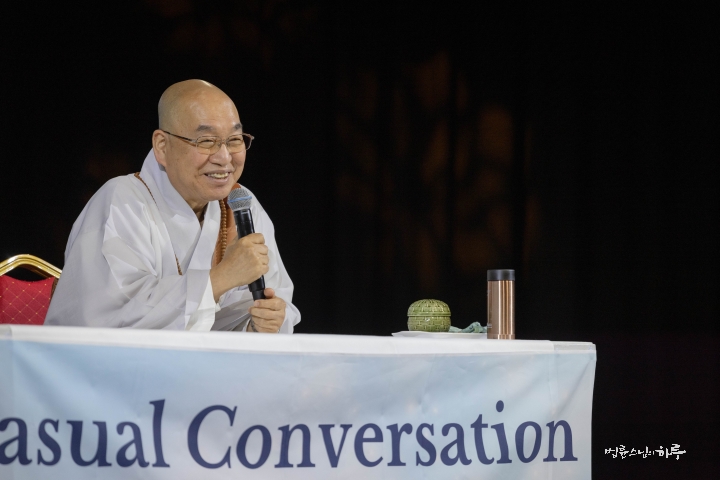
In 1960, when I entered elementary school, Korea’s GDP per capita was $100. Now, 65 years later, it’s $35,000. It has increased 350 times. But have Koreans become that much happier? This is not something from a book, but my direct experience from elementary school until now. Have they become even 35 times happier, let alone 350 times? Or even 3 times happier? From my perspective, it doesn’t seem so. Yet, Koreans think they’re not happy because of the economy and expect to be happy if the economy develops further. If the GDP per capita increases tenfold to $350,000 in the future, will all problems be solved? Looking back at the past, there’s no guarantee that problems will be solved if we continue on this path. Yet, we keep running down this road.
What Does It Mean to Live Well?
If there were no other side effects, we could continue this way. However, we’re now facing a climate crisis and can no longer continue like this. The current climate crisis is being caused by OECD member countries, which account for about 12 billion people, or 15% of the global population. Now, China with its 1.4 billion population is following this path. India, also with 1.4 billion people, is following this path. Other countries are following this path too. If we continue at the current rate, the climate crisis will inevitably worsen rapidly. This is not a distant future issue. So, what should we do?
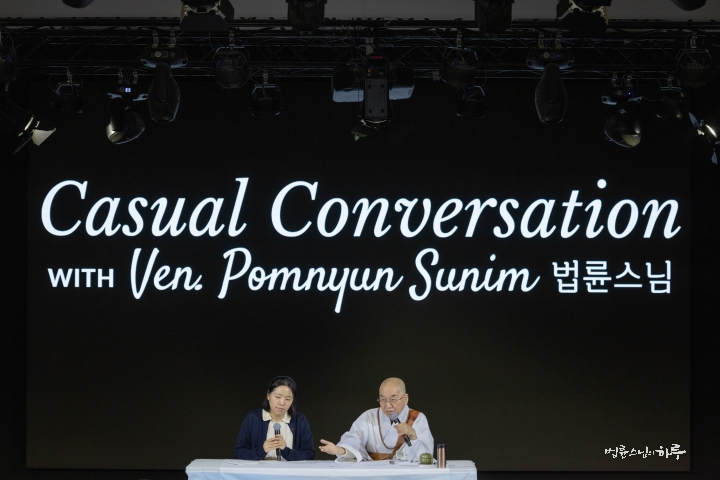
The path we’re currently on is not sustainable. Nor is it a path to happiness. Rather than seeking happiness through consumption, we need to find ways to be happy while consuming less. I believe that Buddha’s life and teachings can provide a clue to the solution. Buddha was happy eating alms, wearing discarded clothes, and sleeping under trees, and he led many people to a path of happiness. Based on Buddha’s life, I think we can create a new model for a sustainable future civilization. I wanted to talk about this, so I arranged this gathering today.”
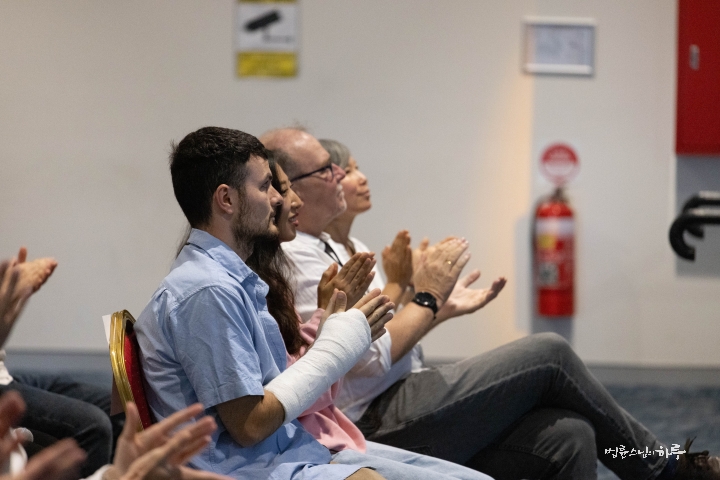
After finishing the lecture at 5:30 PM, Sunim went to his accommodation for dinner.
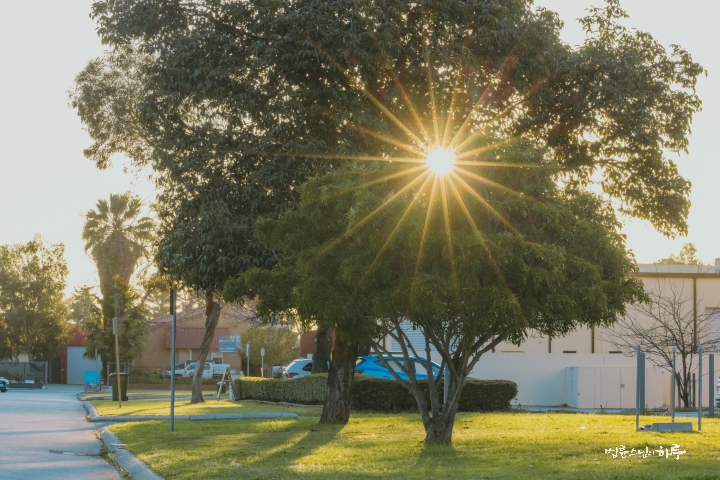
After dinner, Sunim arrived at the lecture hall again at 7 PM.
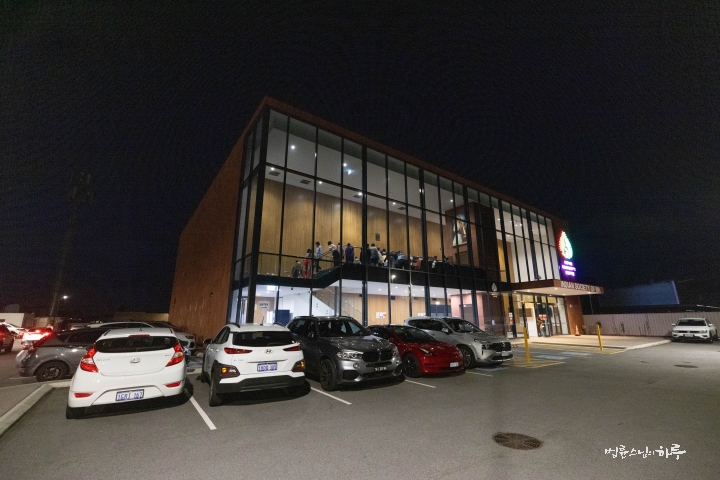
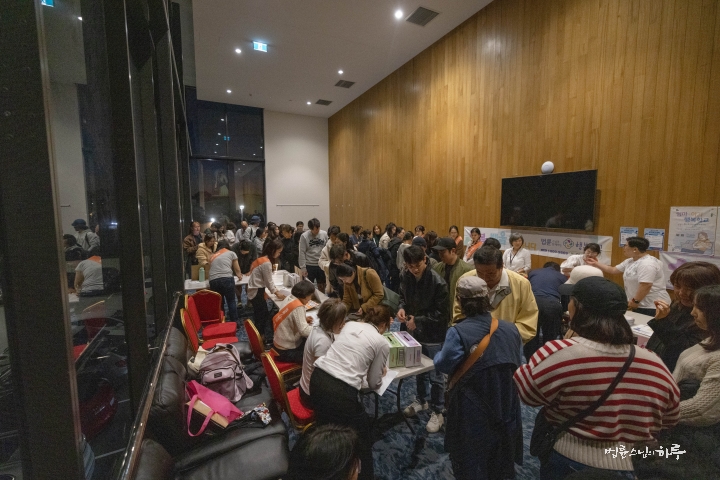
As the introductory video about Sunim ended and he walked onto the stage, a big round of applause and cheers erupted.
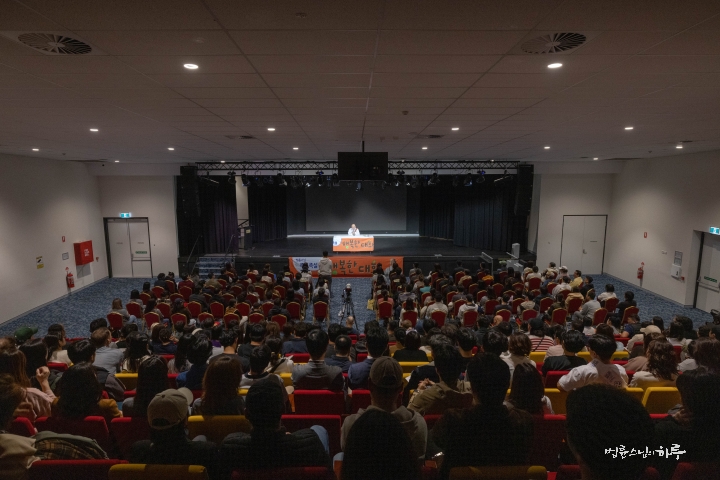
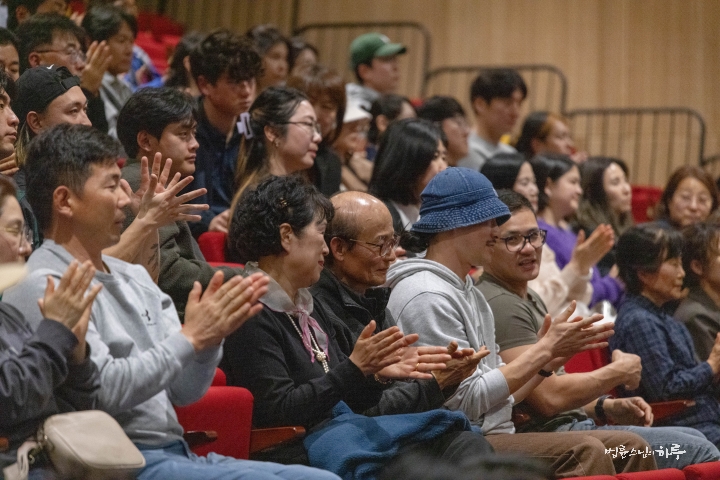
With about 200 people filling the seats, Sunim began the conversation by casually asking how everyone was doing.
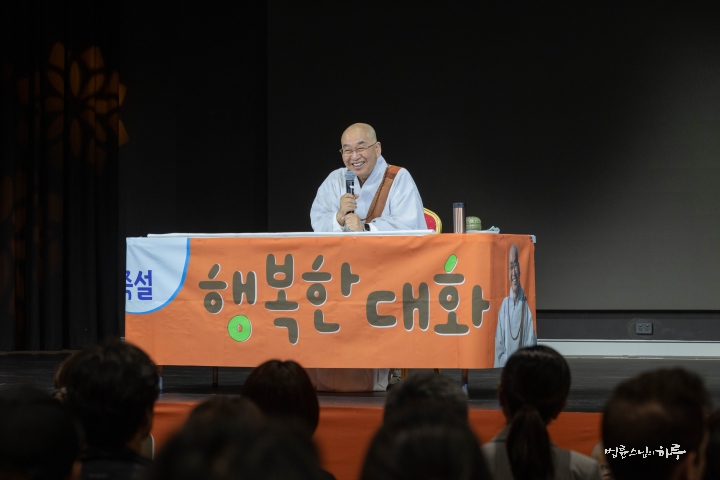
“I’m not sure how long it’s been since I last came to Perth. I think it’s been about 7 years.”
“It was in 2017.”
“Oh, it was 2017? You have a good memory. My first visit to Perth was in 2014 when I gave lectures in 115 places around the world over 115 days, moving to a different country or city every day. That was my first time in Perth. And it seems I came again in 2017. So this must be my third visit. Have you all been well since then?”
“Yes!”
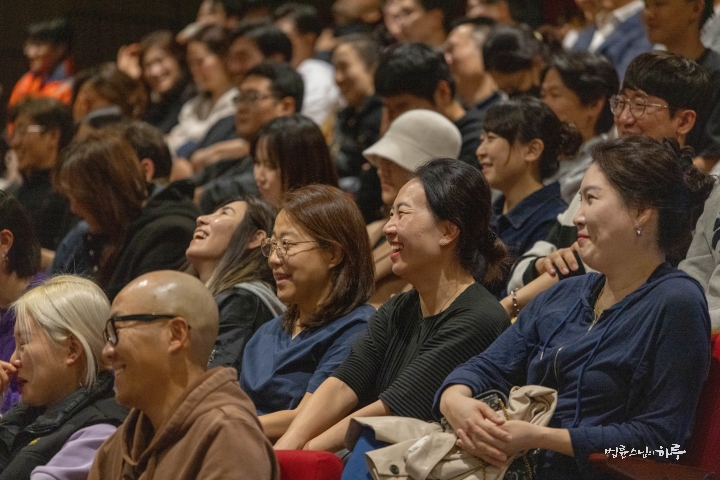
Then, six people who had submitted questions in advance began their dialogue with Sunim. In the latter part of the lecture, five more people asked questions on the spot and conversed with Sunim. Over the course of two hours, eleven people were able to ask Sunim questions. One of them shared their concern about how to treat their parents, saying they had been abused at home during childhood but were afraid of feeling regret if their parents passed away.
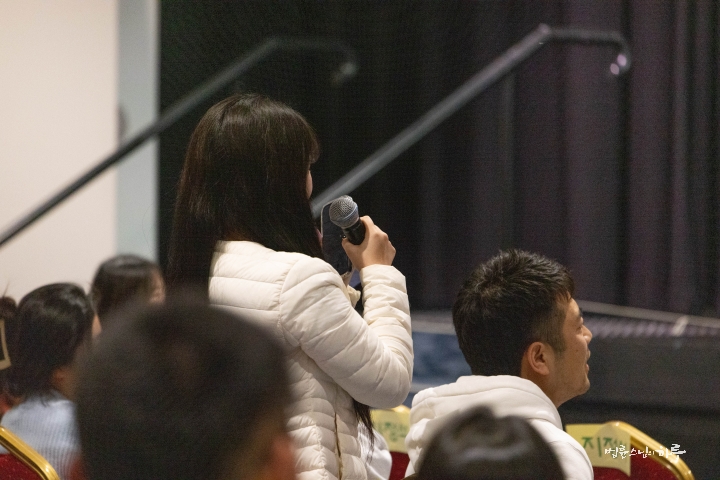
How Much Should I Care for My Parents Who Raised Me in a Domestic Violence Environment?
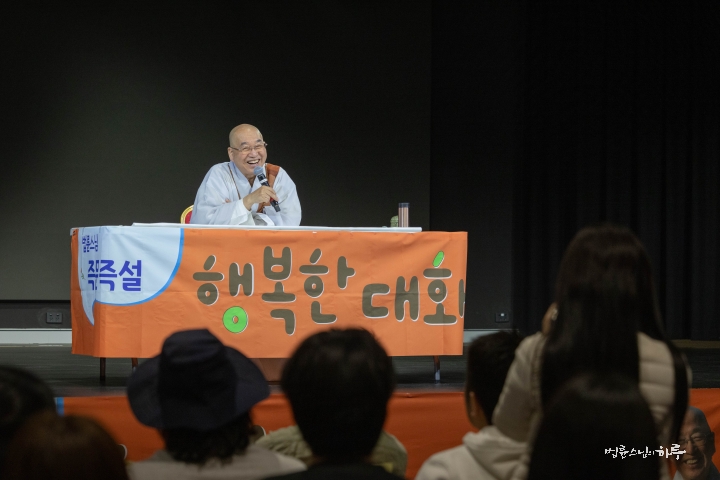
Humans sometimes abandon their own offspring instead of raising them, but this can be seen as an error due to mental illness rather than ecological instinct. We call this an evil act. We don’t discuss good and evil regarding actions based on ecological instincts. We only discuss good and evil for actions resulting from mental factors.
A child caring for elderly parents falls under the category of good deeds that don’t exist in ecological instincts. So we call such actions ‘good’. If we do bad things that even animals don’t do, we call it ‘evil’, and if we do good things that animals don’t do, we call it ‘good’. If we do what animals do, it’s neither good nor evil, but a natural instinct. Good and evil can only be spoken of regarding artificial actions. When healthy people care for the sick, when those with plenty share with the hungry, when educated people teach the uneducated, when adults care for children, when young people care for the elderly, when healthy people care for the disabled – all these actions are called good deeds. These actions, which don’t exist in the animal ecosystem, are all artificial behaviors and are called good deeds. Such good deeds are not obligatory but optional. Parents raising their children is instinctive behavior for all animals in the natural ecosystem, so it’s obligatory. Therefore, not caring for one’s own children is an evil act. Evil acts must be stopped. That’s why the old saying goes, ‘Encourage good and punish evil’. Good deeds are only encouraged. Not doing a good deed doesn’t make it a bad deed. This is because good deeds are not natural ecosystem instincts but are formed through human education.
If the questioner weren’t human, not caring for parents wouldn’t be a problem at all. But the questioner grew up receiving education about doing good deeds. Because you were educated that children should care for their parents, you feel guilty when you don’t care for them. So if you could completely erase the records in your brain and forget, there would be no problem. (Laughs)
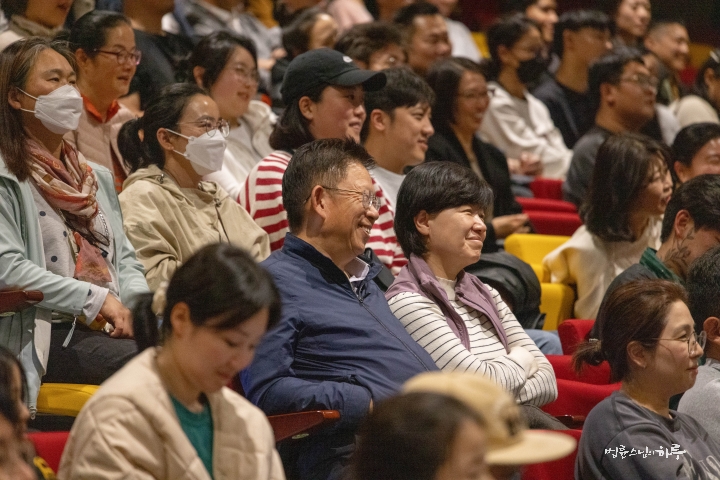
However, because we have learned the good deed of caring for parents, we feel guilty when we don’t care for them. This guilt doesn’t arise from actually committing a sin. Do you feel guilty after spending a night with someone you’re attracted to? If it was consensual, you don’t feel guilty. But if a monk or priest spends a night with someone they like, they feel guilty. Why does the same act sometimes create guilt and sometimes not? It’s because we’ve set standards called precepts that say ‘certain actions shouldn’t be done’. People who have promised to keep these precepts feel guilty when they break them. Similarly, feeling guilty for not caring for parents is due to having standards formed through education.
While not caring for parents can’t be considered a sin by natural ecosystem standards, as humans, we can feel guilty due to learning. So, it’s better to do good deeds not for your parents, but to free yourself from guilt. Making phone calls, sending some pocket money – doing these things is not so much to help your parents but to feel less troubled after they pass away. It’s a way to prevent future suffering.
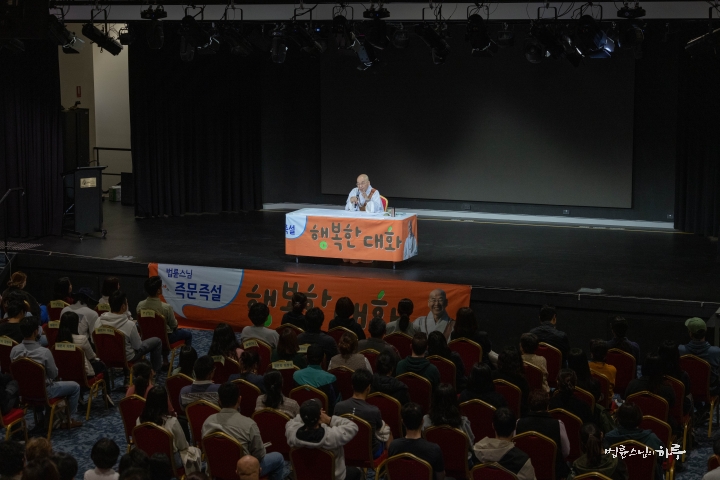
Anyway, your parents fed and cared for you since you were young. Parents also get angry, irritated, and sometimes hit their children because they themselves are struggling. So most of us have wounds from our parents. At the same time, we have received grace from our parents. That’s why the most troublesome relationship is between parents and children. If it were strangers, you could just avoid meeting them when you dislike them, but with parents, the relationship doesn’t end even if you don’t meet. This is because there’s grace received from parents. So you might think you should care for them since you’ve received grace, but when you actually meet and talk, the wounds reopen. Memories of being scolded or hit in the past come up. Even just hearing their voice can bring up wounds. Meeting leads to fighting, parting leads to regret, meeting again leads to fighting, parting again leads to regret – this cycle repeats in our lives in the relationship between parents and children.
You don’t need to feel too guilty for not caring for your parents. However, even if you try not to feel guilty, because the standard that you should care for your parents has been unconsciously formed through education, you can’t help but feel guilty when your parents pass away. To feel less guilty, it’s good to call them now, give them some pocket money, or visit them occasionally even if it leads to arguments. This way, you’ll have fewer regrets after your parents pass away. As the old saying goes, ‘The unfilial son cries the most at the funeral’, those who cry a lot at funerals are usually those who couldn’t properly care for their parents while they were alive. (Laughs)
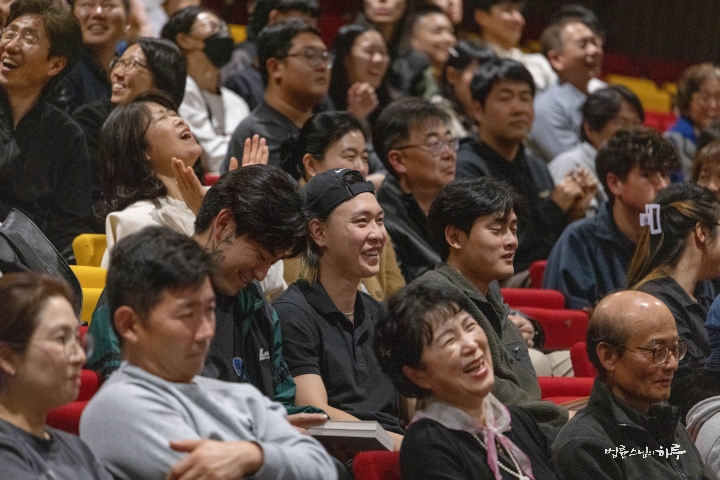
Not only the questioner but all of you living abroad likely share similar concerns. Even those in Korea often can’t practice filial piety effectively, but you may feel more distressed because you mistakenly think you can’t fulfill your filial duties due to being overseas. In reality, even if you were to go back to Korea, you’d probably only stay with your parents for a few days before packing up and returning. Crying and worrying about your parents back home doesn’t help anyone. Instead of wasting emotions, it’s better for both you and your parents if you make a phone call or send them some pocket money, even if it’s just a small amount.
Your father’s tendency to get angry easily could be due to his hearing impairment. There’s an old saying in rural areas: “Only the deaf fight with sickles.” This is because not being able to hear makes one frustrated. So if you understand that “Father gets angry a lot because he can’t hear well and feels frustrated,” it’s not really a big problem. It might have been hurtful when you were young, but as an adult, you can understand that parents are also human beings who can’t help but act in certain ways. They’re neither someone to hate nor pity. Also, like in Australia, Korea provides pensions based on disability levels. There’s also an old-age pension. While they may not live luxuriously, the government provides enough support so that they won’t starve. So you don’t need to worry too much.
First, it’s important that you live well yourself. From your parents’ perspective, seeing their child doing well is the best thing. Second, if you have some extra money, send them even a small amount as pocket money with your heart in it, make phone calls, and when you have a chance to visit Korea, meet them even if it’s just for a short time. Doing these things is not only for your parents but ultimately for yourself when you think about the future. It would be good to have this perspective.”
“Thank you.”
The questions continued. Today, there were many light-hearted and cheerful questions as well.
One person asked for Sunim’s advice on how to handle a situation where a newly adopted puppy seemed to have gained a higher status in the household than themselves.
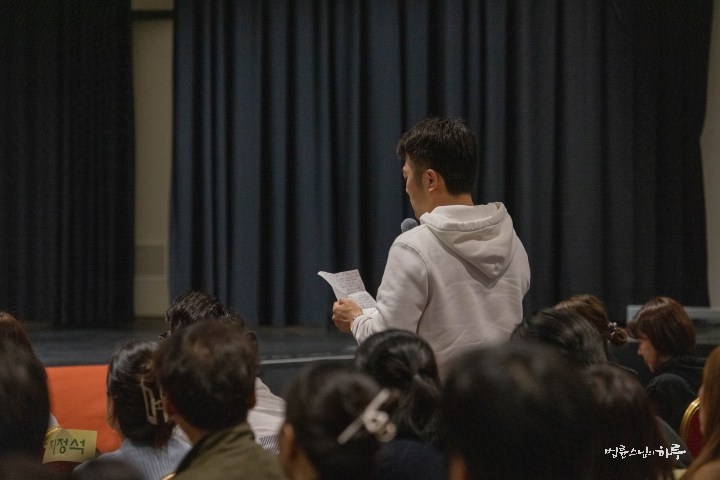
Why Does the Puppy Have a Higher Status Than Me at Home?
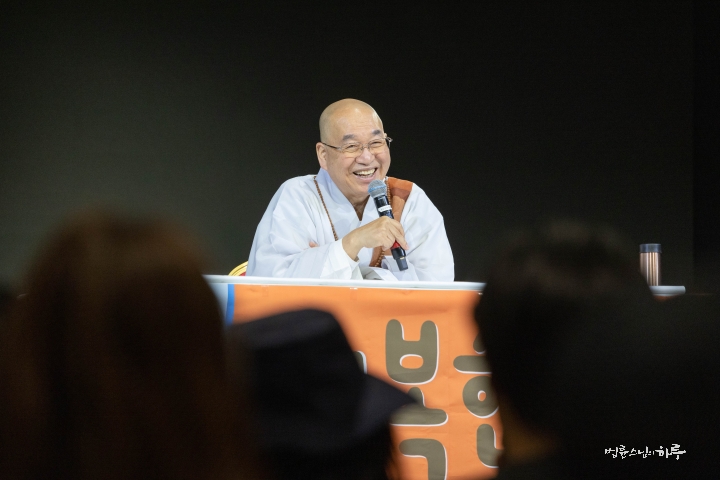
Sunim’s witty response made everyone burst into laughter.
The last questioner asked how to overcome the tedium that comes with aging, noting that there seem to be fewer things to laugh about as one gets older.
How Can We Overcome the Tedium That Comes With Aging?
“No.”
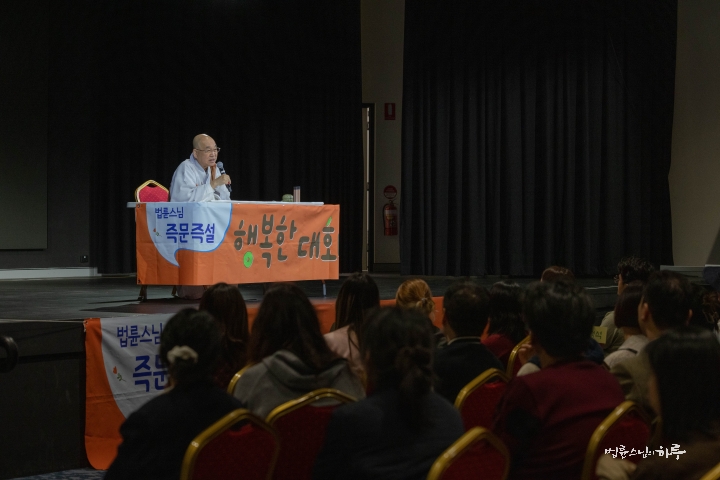
“Saying you feel tedium means that externally, nothing much is happening and you’re comfortable. In other words, you’re bored. When you’re this bored, something will definitely happen. Because you need to escape from boredom. This psychological state unconsciously invites calamity. Something needs to happen for the tedium to disappear. So, when your children are doing well in school, your spouse is fine, and your business is going well – that is, when nothing much is happening – that’s when you should practice more diligently, give more to others, and do more volunteer work. This doesn’t necessarily prevent calamities from happening, but having an attitude of sharing can help prevent them.
But when nothing is happening, you tend to think, ‘Well, I don’t need to practice anymore, I’m doing fine,’ and you stop practicing and volunteering. Then when calamity strikes, you panic and start praying frantically again. To stay healthy, is it better to treat an illness after it occurs or to prevent it?”
“Prevention is better.”
“Prevention is indeed the best. What’s the key to prevention? Is it being in a state where there are no pathogens at all? Or is it building your immunity so that you can overcome any pathogens? Building immunity is true prevention. Similarly, it’s not a blessing if nothing ever happens to you. When accidents happen here and there, when this and that occur, and you can handle this one way and that another way, that’s when you build immunity. Some days you work late, some days you finish early – all these situations are just part of human life. Having the inner strength to view things this way is immunity. With this perspective, nothing is a problem no matter what happens.
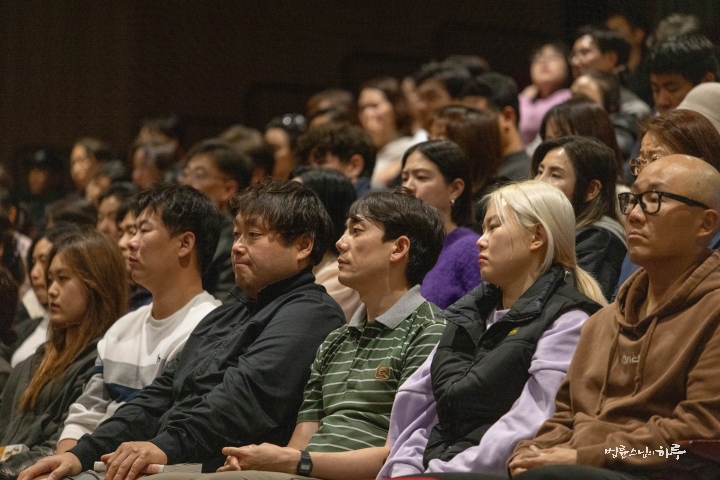
But people without immunity make a fuss if just one thing doesn’t go their way. If you look at what people pray for when they go to fortune tellers, it’s mostly ‘Please make everything sterile.’ They pray, ‘Please let nothing happen.’ But if nothing ever happened, could human civilization have progressed? It’s because of floods and droughts that we developed technologies to dig wells, build dams, and create levees. If rain always fell appropriately, humans wouldn’t need to develop civilization. We could just live as things are given. As Toynbee said, history is a series of challenges and responses.
So it’s good for you to have some stimulation. But you’re lazy and keep thinking, ‘I wish nothing would happen.’ Yet when nothing happens, you feel tedium and get bored. That’s why during periods of tedium, whether you’re a woman or a man, you might be tempted to have an affair or fall into gambling. When you’re bored and think, ‘Isn’t there anything fun to do?’ accidents happen. At such times, you should practice more diligently or do more volunteer work at church or temple. Read books, tend to your garden so you’re not bored. By doing so, you can prevent calamities.”
“Thank you.”
There were many more questions that followed.
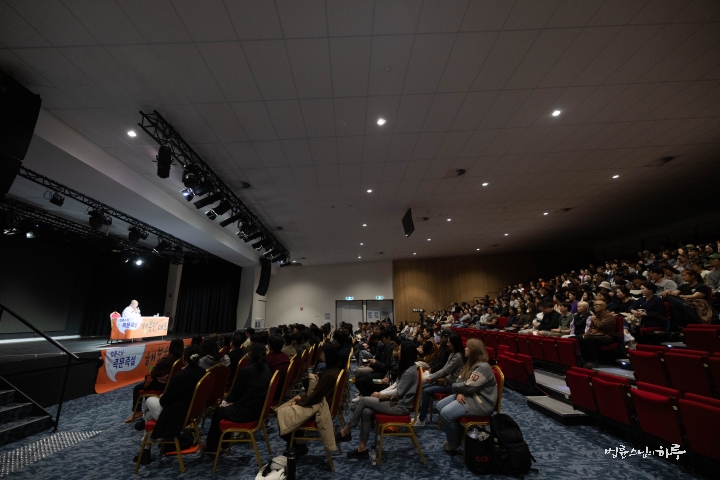
I’m a student who has been living in Australia on a working holiday visa for a year. While working here, I suddenly felt like studying. Is it okay to start studying again even though I’ve left it for a while?
I’ve suppressed my emotions so much that now it’s hard for me to feel them. How can I overcome this suppression and feel emotions again?
After my divorce, I received a restraining order and can’t see my two daughters. How should I view maternal love? Should I give up on meeting my children?
Is a dream or goal absolutely necessary in life? How can I have dreams or goals?
When I look at newspapers, broadcasts, and SNS, there’s an overwhelming amount of information. How can I maintain my center amidst this flood of information?
After marriage, I’m raising three children. My father in Korea is very ill, but I feel guilty because I’m living a happy life with my children in Australia.
I write a diary every night, but I get angry thinking about the losses I’ve had and can’t sleep. How should I manage my mind?
After answering all the questions, Sunim gave his closing remarks.
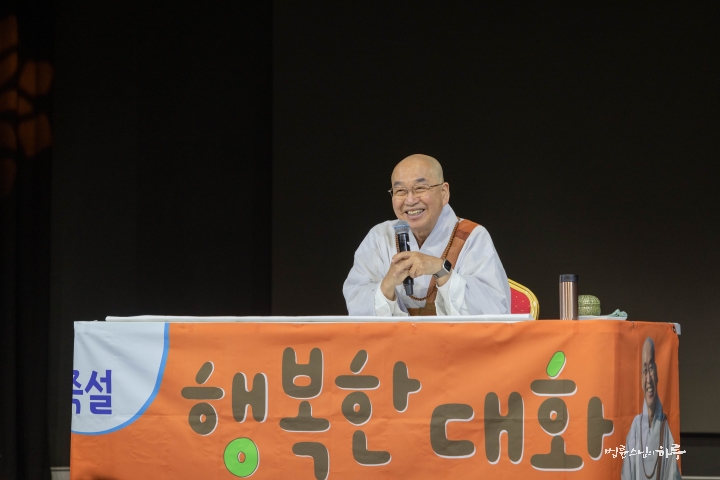
“Was it interesting?”
“Yes!”
“Was it beneficial?”
“Yes!”
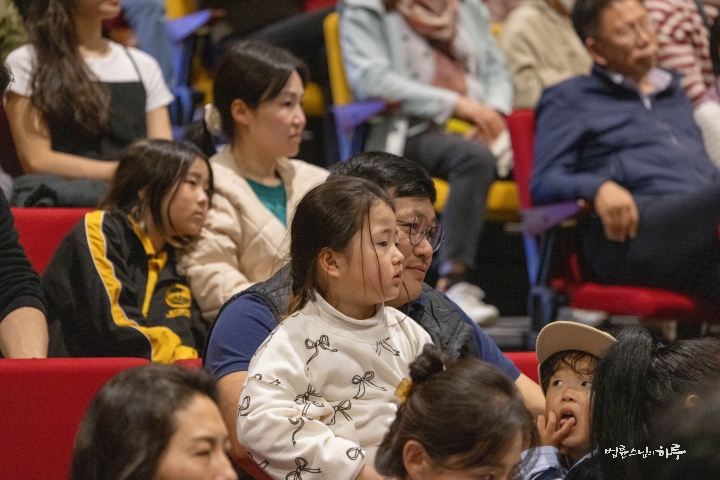
“If it’s only beneficial and not interesting, it’s boring. If it’s only interesting and not beneficial, there’s nothing left when you open the door and leave after the lecture. Truth is both interesting and beneficial. Being interesting means it’s good now, and being beneficial means it’s good later. Our lives should be good both now and later. But we often either struggle now for the sake of the future, or enjoy now and struggle later. If we’re too emotional, we enjoy now but suffer later, and if we’re too rational, we live a hard life now to be good later. Practice means being good both now and later. The result should be good, but the process should be good too. So don’t live too tensely, trying too hard, and gritting your teeth. But that doesn’t mean you should live recklessly either. I’d like to suggest that you live a little more lightly.”
By the time the conversation ended, it was well past 9 PM.
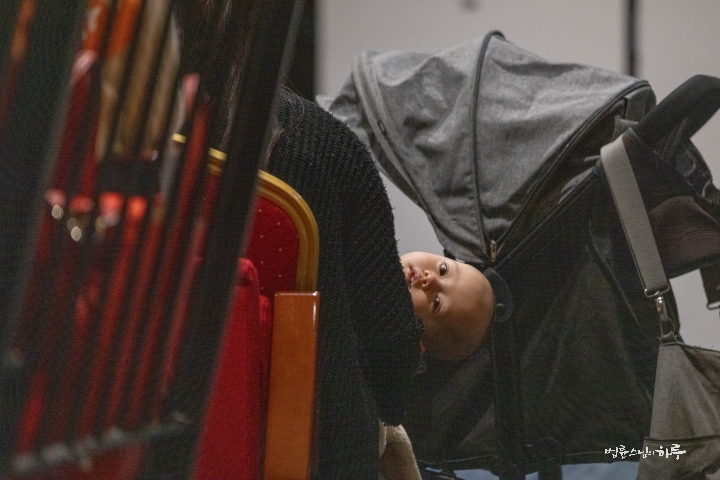
Immediately after, Sunim held a book signing session on stage. Many people lined up to receive Sunim’s signature and express their gratitude.
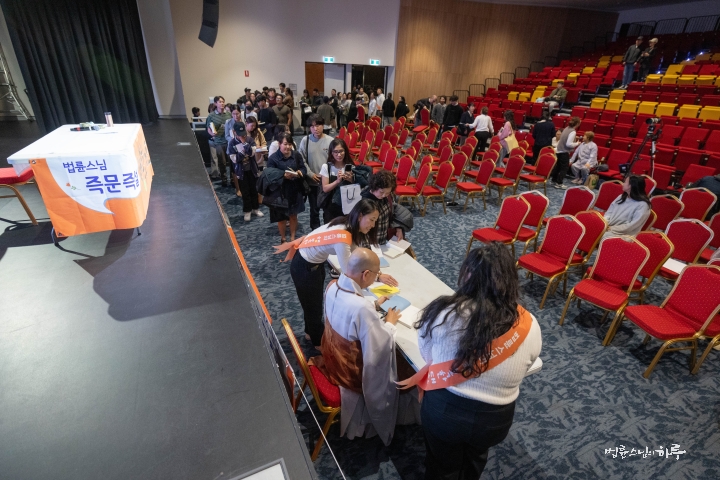
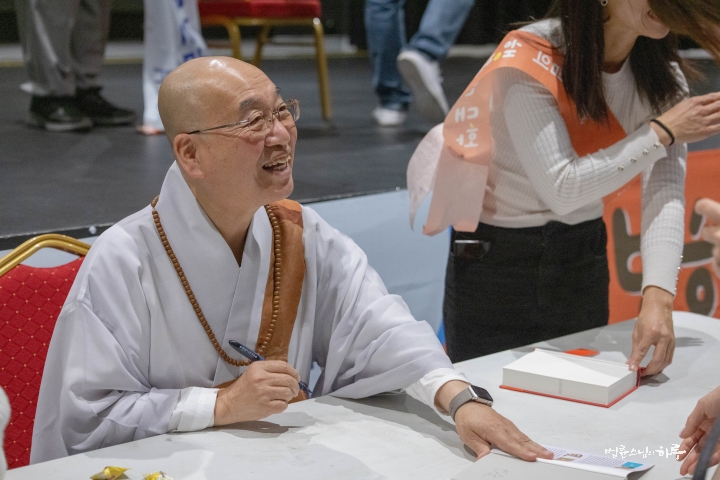
After the book signing, Sunim took a commemorative photo with the volunteers who prepared for the lecture.
“Perth!”
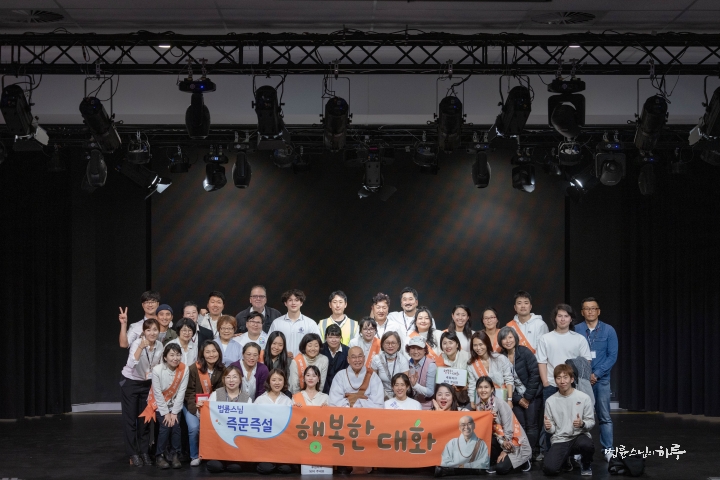
After all the audience members left the lecture hall, Sunim spent time greeting the volunteers.
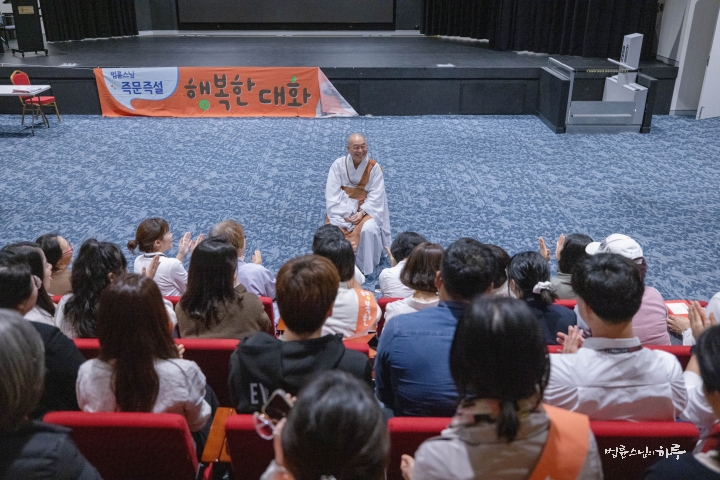
One by one, they took the microphone and briefly introduced themselves. After each introduction, everyone applauded enthusiastically.
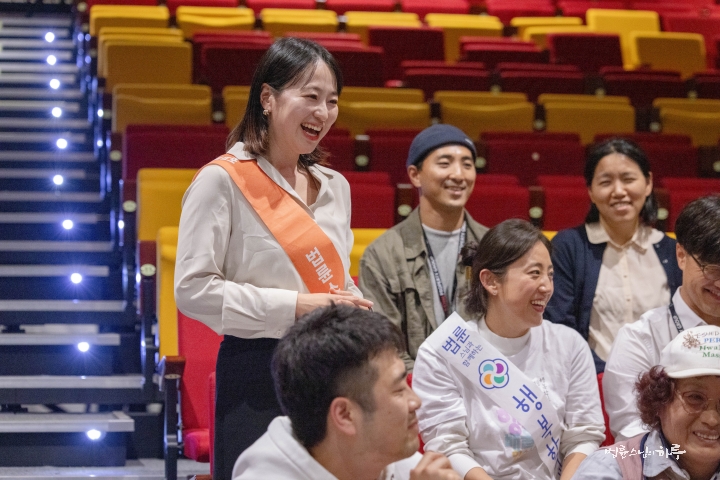
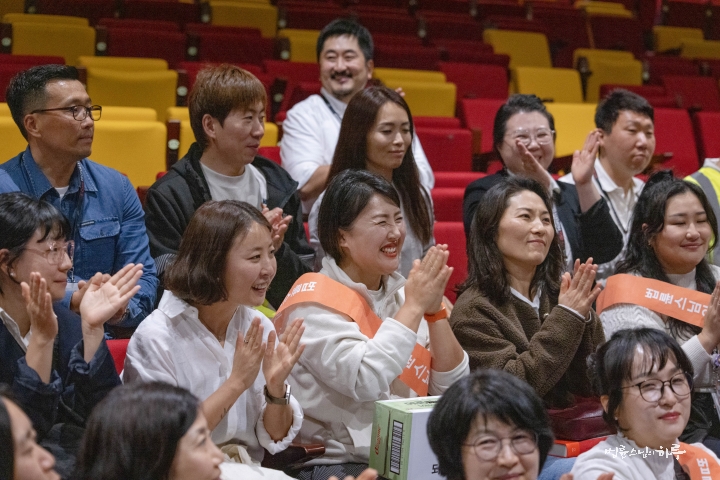
Their names, ages, occupations, and the number of years they had lived in Australia all varied. After listening to all the introductions, Sunim smiled and said:
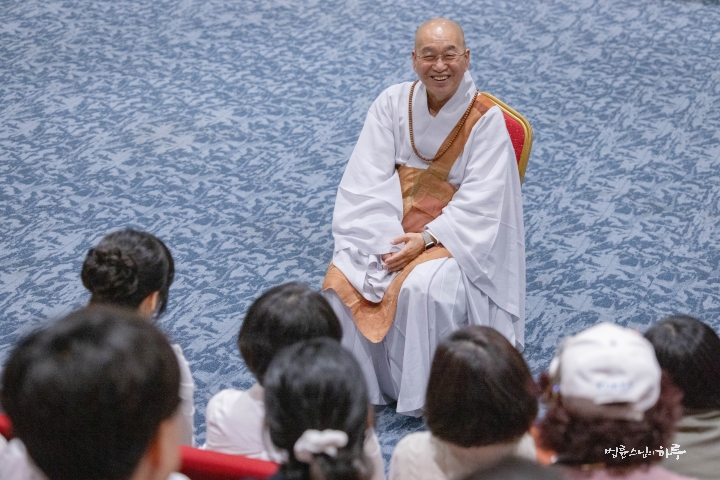
“Now I have a rough idea of what you all do. I’ll prepare plenty of volunteer work for you to do after retirement. If you want to go to Bhutan, Cambodia, Vietnam, Laos, etc., you can go anytime. After retirement, don’t try too hard to make money. It would be good to live on your pension and volunteer for about 10 years. There are many places that need the talents you have. If we’re destined to meet again, we will. Until then, I hope you live happily. Thank you.”
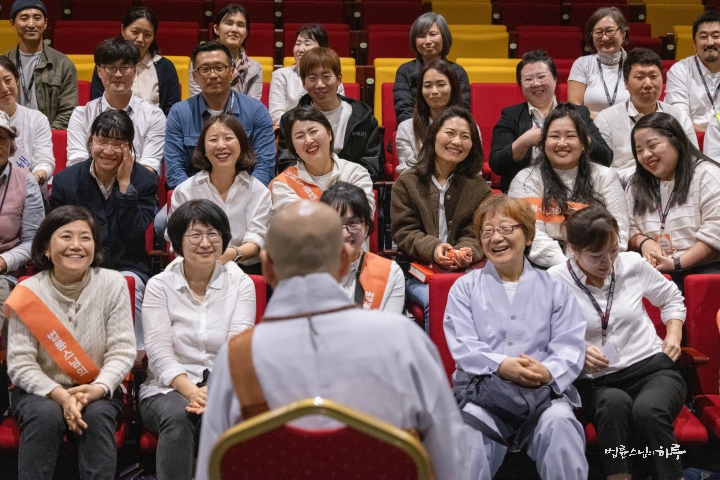
Sunim gifted his *Diamond Sutra* book to those who oversaw the lecture and provided accommodation, expressing his gratitude.
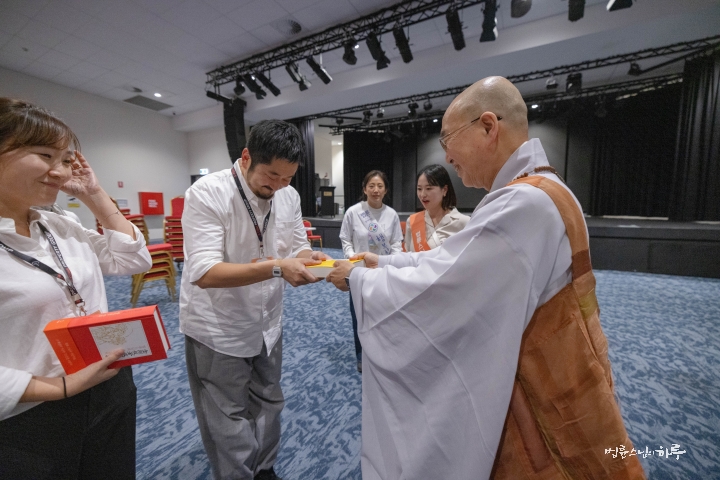
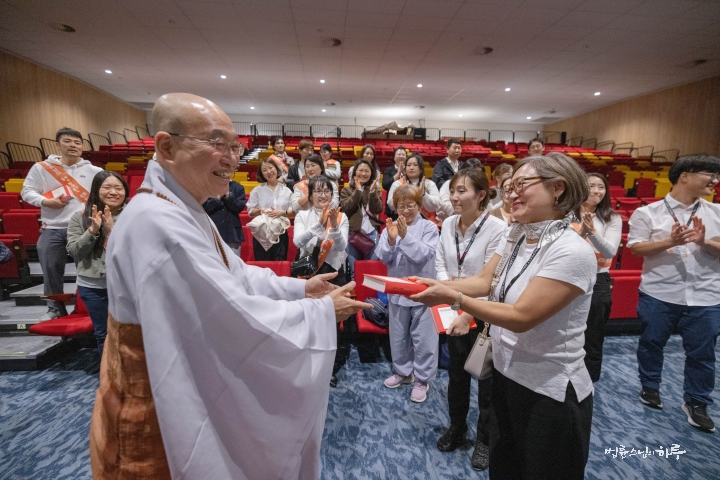
After thanking the volunteers, Sunim left the lecture hall. The president of the Perth Korean Association, who had been waiting outside, came to greet Sunim.
“Sunim, I enjoyed your lecture.”
“Thank you.”
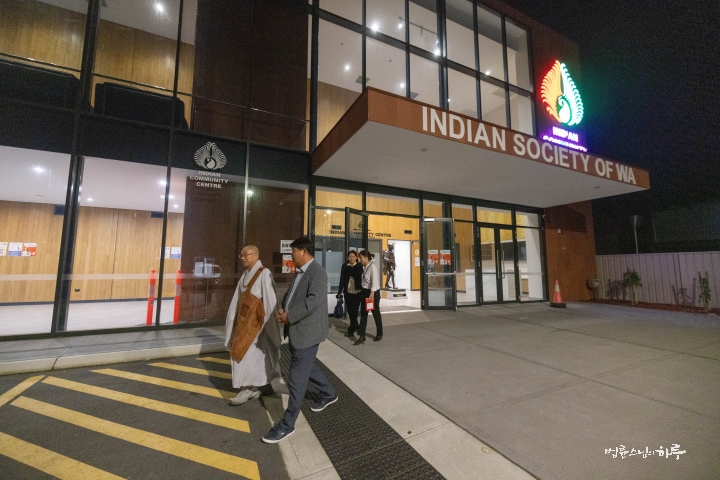
After a brief exchange of greetings, Sunim departed for his accommodation. It was past 10 PM when he arrived at the lodging. It had been another long day.
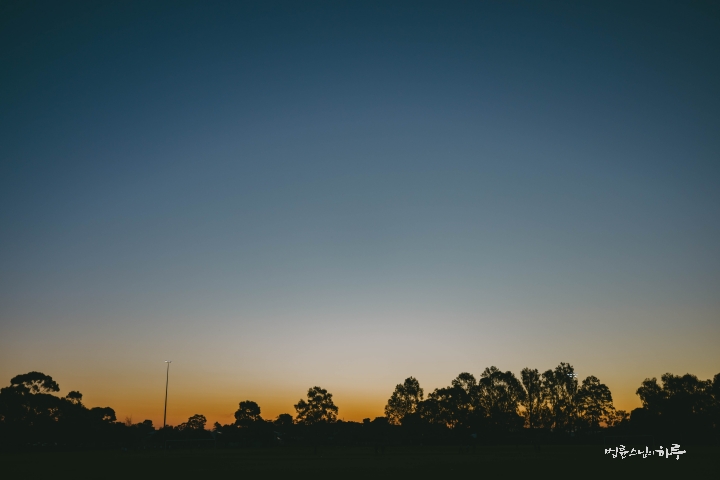
Tomorrow, Sunim will move from Perth Airport to Brisbane Airport in the morning, and in the evening, he is scheduled to give a Dharma Q&A lecture for Korean expatriates living in Brisbane.




